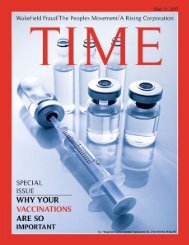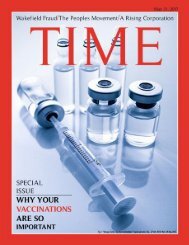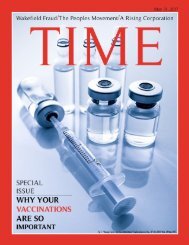JEP mag
You also want an ePaper? Increase the reach of your titles
YUMPU automatically turns print PDFs into web optimized ePapers that Google loves.
Importance of Vaccinations<br />
Written By: Dan Hirschhorn<br />
Vaccinations play a very important<br />
role in protecting us, the people<br />
of the world, no matter what your<br />
ethnic, religious, or economic background<br />
is. There are benefits of the masses<br />
getting vaccines, one such benefit is<br />
that even the people that do not receive<br />
immunizations are less likely to contract<br />
it. This is important to keep in mind, as<br />
those who are unable to receive vaccinations<br />
for various reasons such as elderly,<br />
those who are pregnant, and people<br />
with severe allergies are still kept safe<br />
with every other person that is vaccinated.<br />
Gambia was able to get rid of their<br />
Hib disease problem entirely when just<br />
70 percent of their overall population<br />
was vaccinated. The opposite can be<br />
achieved if people decided they did not<br />
need vaccines any more, for whatever<br />
reason they may have. If a large number<br />
of people stop receiving vaccinations,<br />
then the chances of a disease outbreak<br />
increase greatly. “The Andrew Wakefield<br />
study did just that, greatly reducing<br />
the amount of people that got vaccines<br />
by instilling fear in the people, a fear<br />
of autism. His study effectively caused<br />
a measles, mumps, and rubella disease<br />
outbreak, which could have easily been<br />
prevented if they kept on receiving the<br />
proper vaccinations for the disease”<br />
(Rao para 13). The number of people<br />
affected by MMR was just several dozen<br />
in 1997, but that number quickly skyrocketed<br />
to over 2,000 cases in 2011.<br />
Outbreaks of the whooping cough in the<br />
United States have been linked to low<br />
vaccination rates. There are many types<br />
of vaccines that someone can receive,<br />
and each type has certain advantages<br />
and disadvantages that go along with<br />
them. The first type of vaccination that<br />
you can receive is a live attenuated vaccine,<br />
where a weak asymptotic form of<br />
a virus is introduced into the body. This<br />
form will not cause sickness, instead it<br />
will allow the body, specifically the immune<br />
system, to recognize the antigens<br />
that the virus has, and be able to fight<br />
it in the future, if you were ever to encounter<br />
it again. This is good for giving<br />
someone lifelong immunity to a virus, as<br />
it is live and allows the body to adapt<br />
to it. However, this form of vaccination<br />
is not used on people with weakened immune<br />
systems, as that could lead to the<br />
virus causing sickness. Refrigeration is required<br />
to keep the pathogens alive long<br />
enough to be used. Common vaccines<br />
used in this life style are the measles,<br />
mumps, rubella vaccine, the chickenpox<br />
vaccine, influenza vaccine, and the rotavirus<br />
vaccine. Inactivated vaccines are<br />
those where the bacteria or viruses are<br />
killed off with chemicals or heat to accomplish<br />
a similar effect as the live virus<br />
when introduced into the body. The immune<br />
system is still able to learn from the<br />
dead cells, and is able to fight live versions<br />
of the virus or bacteria if it were to<br />
encounter them in the future. This style is<br />
much safer to give, as there is no risk of<br />
the virus or bacteria mutating back into<br />
its disease causing form, and it is able<br />
to be easily stored as there is no risk of<br />
killing the pathogens. Seeing as you are<br />
administering dead versions of the virus<br />
into your body, it takes more doses of<br />
6 TIME May 31, 2017





